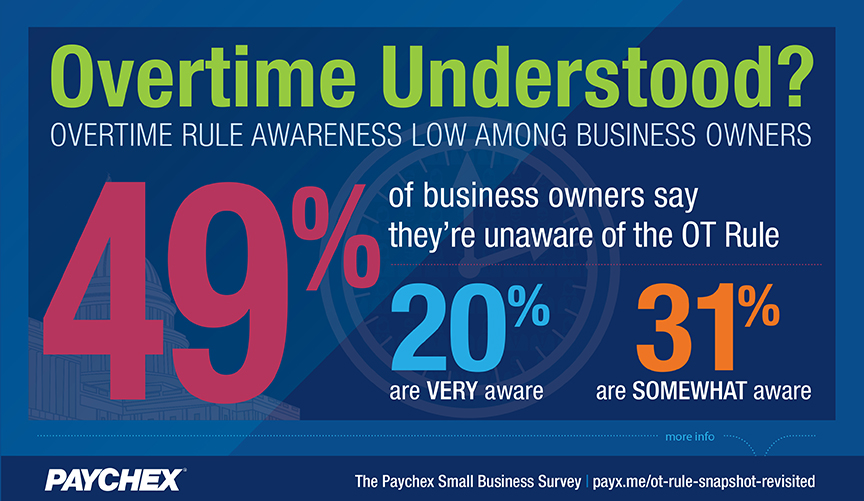It’s been almost four months since the U.S. Department of Labor (DOL) released the highly anticipated final overtime rule, but despite much publicity and speculation about its impending impact, research indicates awareness of the rule remains low among business owners.
A study by Paychex, Inc., a provider of integrated human capital management solutions for payroll, HR, retirement, and insurance services, shows that 49% of business owners polled remain unaware of the DOL’s final overtime rule.
The final rule, unveiled May 18, 2016, updates the overtime regulations under the Fair Labor Standards Act by raising the salary threshold from $455 per week ($23,660 for an employee who works for an entire year) to $913 per week ($47,476 per year) for the executive, administrative, and professional (white collar) exemptions. The final rule also increased the annual compensation for the Highly Compensated Employee exemption from $100,000 to $134,004, while also establishing a mechanism to update all salary and compensation levels every three years beginning in 2020. The new rule will take effect on December 1, 2016.
According to Paychex’s latest research, 20% of respondents report being “very aware” of the overtime rule, while 31% say they’re “somewhat aware.” Of those surveyed who selected either of those answers, 67% believe it will have “little or no impact” on their business. Meanwhile, 26% predict it will have “somewhat of an impact” and 7% believe it will have a “major impact.” Of those believing the overtime rule will have an impact on their business, 36% say they’ll be transitioning impacted employees to non-exempt status, 21% will choose to redistribute hours to minimize overtime hours worked, and 7% plan on making adjustments to employee salaries in light of the new rule.
“This study clearly indicates there is a large contingent of business owners who are unaware of the overtime rule,” said Paychex president and CEO Martin Mucci. “These results are particularly concerning as we have every reason to believe the implications of the overtime rule will be far-reaching. December 1 is just a few short months away. Therefore, we highly recommend business owners familiarize themselves with the rule, determine how they may be impacted, and begin preparing now for full compliance and what it will mean for future business operations.”
The DOL estimates the rule will affect an estimated 4.2 million salaried, exempt workers who will become newly eligible for overtime pay, and an audit of Paychex’s 600,000+ clients also revealed the impact of the rule will be significant. Company data indicates that more than a quarter of its clients’ employees could lose their exempt status and become eligible to receive overtime as of December 1, 2016.
With the effective date fast-approaching, preparedness will be key for business owners trying to avoid potential penalties. Of those surveyed who believe they will be at least somewhat impacted, 55% say they feel “somewhat prepared” and 34% report being “very prepared.” Conversely, 12% claim to not be prepared for the rule at all.
Of those surveyed who are at least partially aware of the rule, the majority (66%) feel that it will not have as great an impact on their company as other regulatory developments such as a minimum wage increase or paid sick leave law. Meanwhile, 16% believe the final overtime rule will place a financial burden on their business. Other respondents (17%) feel the final overtime rule will offer an opportunity for them to complete a wage and hour self-audit of all positions within their company.
Paychex released a similar study in April, prior to the OT rule being finalized. At that time, 1 in 5 business owners polled said they were unaware of the rule and 55% believed the OT rule would have little or no impact on their business.
For educational resources to help your business prepare for the December 1 effective date of the final overtime rule, visit www.paychex.com. In addition, Paychex offers an advanced suite of time and attendance products, including web and mobile tools, to assist businesses and employees with the scheduling, tracking, and reporting of time. Solutions such as these can assist companies with efforts to enforce their own policies and comply with applicable rules and regulations.
Thanks for reading CPA Practice Advisor!
Subscribe Already registered? Log In
Need more information? Read the FAQs




